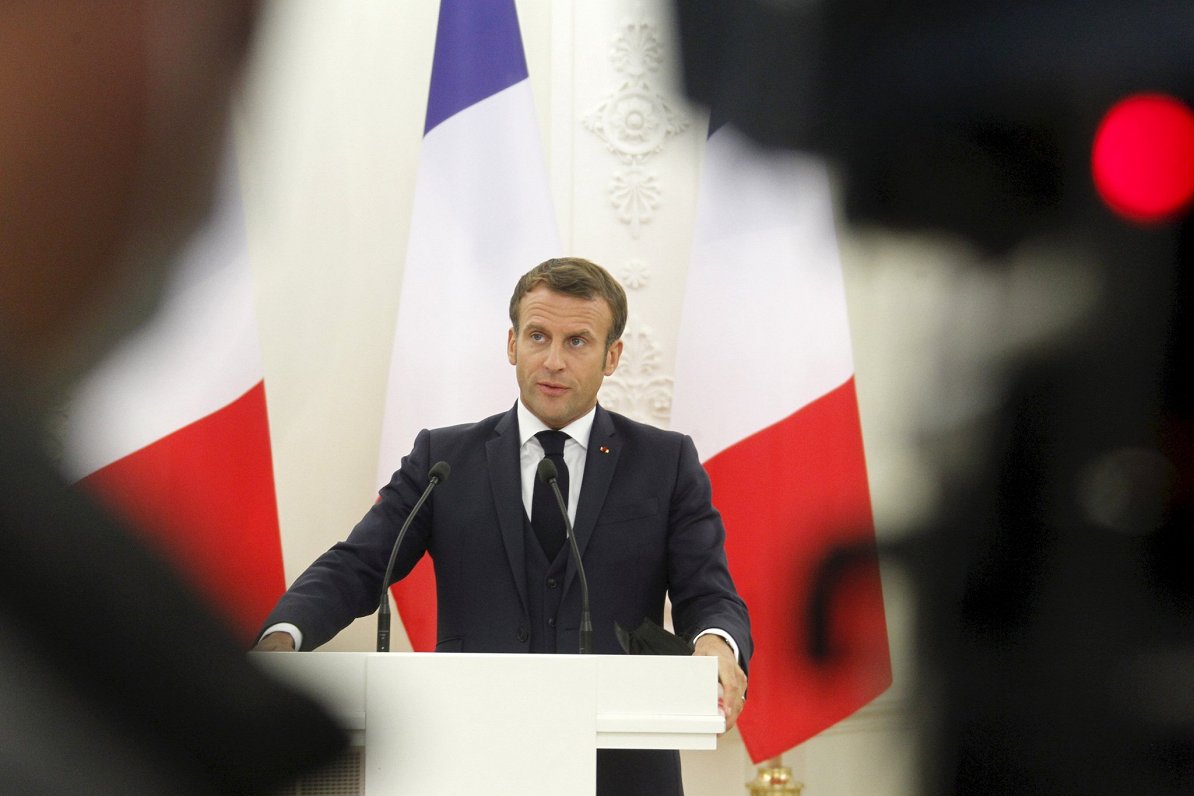The declaration drops broad hints about the direction future European Union policy should take in several important areas but restricts itself to internal EU matters -- there is no mention for example of the current crisis of democracy in Belarus which borders both Latvia and Lithuania.
The text in French and English is available at the website of the French embassy in Latvia.
JOINT STATEMENT BY THE PRESIDENTS OF FRANCE AND LITHUANIA, AND PRIME MINISTER OF LATVIA ON PROTECTION OF DEMOCRACIES
When presenting her policy priorities to the European Parliament on 16 July 2019, the President of the European Commission announced her intention to put forward a European Democracy Action Plan, in order to protect our democratic systems and institutions from any external intervention. Cyberattacks and disinformation, which have become increasingly destructive and frequent, as the COVID-19 crisis showed, are a threat to democracy and social cohesion because of their influence on public debate, on public policies and on election campaigns. At the initiative of the European Commission, a Code of Practice was adopted and a European election cooperation network was created in 2018 in order to enable national authorities to swiftly detect threats to the elections to the European Parliament, to exchange information and to implement a coordinated response. We, as European democracies, should go further.
France, Lithuania and Latvia recommend that the European Democracy Action Plan include the following measures.
09_28_joint_statement_by_the_presidents_of_france_and_lithuania_and_prime_minister_of_latvia_on_protection_of_democracies.pdf
Download86.77 KB
Firstly, we need to ensure the security of our electoral processes, at both European and national levels, and guarantee the integrity of election results. The security of national elections is common challenge for European Union democracies. It requires both coordination, complementarity and solidarity. Based on the model of Frontex, RescEU or PESCO project on cyber rapid response teams, a joint election protection mechanism could establish a reserve of national experts who could be called up to help any Member State requesting support to protect its election system from attacks. This essential protection needs to be provided by European countries themselves. The aim of this joint mechanism would be as follows: a preventive aspect, based on Member States request, to identify attempts to destabilize electoral processes; and a feedback aspect within the cooperation network on elections on the most effective forms of action and sharing of best practices.
We also need to strengthen our resilience against disinformation. In the context of elections, it can undermine the turnout and confidence in the election process, as well as the legitimacy and trust in national and EU institutions. Information is also a common good on which the quality of public debate depends. In this area the European institutions already have set up tools: the European Centre of Excellence for Countering Hybrid Threats, Stratcom task forces’ activities, the EUvsDisinfo initiative, the European Action Plan against Disinformation and the creation of the Rapid Alert System.
While the role of civil society as well as independent and plural media remains central to ensuring the resilience of our democracies, it is also essential to create more robust public action tools of a regulatory nature to address disinformation, including but not limited to the context of elections. In the spirit of the self-regulatory Code of Practice on Disinformation, which was the first EU-wide effort to tackle online disinformation, the EU should take further steps towards accountability and transparency for online platforms in addressing disinformation.
These steps should be based on the primacy of fundamental rights. EU should establish a regulatory framework with common standards and obligations for online platforms, along with enforcement mechanisms, in several important areas. These areas include, inter alia, minimum level of capabilities and tools necessary to combat disinformation campaigns online; effective GDPR-compliant sharing of relevant data with independent researchers and fact-checkers; full transparency of online paid political speech, including political advertising and means for targeting; basic standards for social responsibility in algorithmic design; prevention of unjustified and non-transparent content takedowns, which can only be provided by offering transparency on all takedowns, suspensions and redresses.
Lastly, the funding of European political parties is subject to specific rules and governance, but this is not enough to protect the life of our democracies from external influences. In spite of the ban on European political parties receiving funding from outside the European Union, there are still loopholes in our regulation, in particular regarding indirect funding. We call for a necessary revision of Regulation 1141/2014 on the statute and funding of European political parties to prohibit not only direct funding of European parties through foreign interests but also indirect foreign funding of them (through national parties or private donations). This revision should come into force before the next European elections in 2024.
Democracy rests on trust, which itself builds on fairness and transparency. Those foundations need to be upheld by strong actions and measures against any attempt to undermine them. France, Lithuania and Latvia firmly believe that, as the European and domestic political spaces become ever more intertwined, it is now for the EU to take action.
Emmanuel Macron
President
French Republic
Gitanas Nausėda
President
Republic of Lithuania
Arturs Krišjānis Kariņš
Prime Minister
Republic of Latvia





























